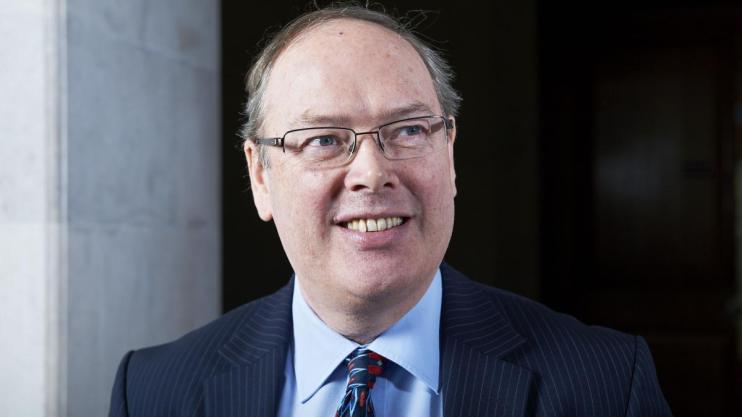Interview: Former rate setter Andrew Sentance on Governor Bailey’s ‘off the cuff’ remarks and where the BoE went wrong

It is often a mark of how dire an economy’s situation is when incremental rises in interest rates hit the front pages.
The worst cost of living crunch in a generation has, however, sent the Bank of England to the front of many households’ minds.
Those outside of the City care less about the vagaries of how to make monetary policy work and are more concerned about its impact on their mortgage.
Nonetheless, former rate setter Andrew Sentance, now an advisor to Cambridge Econometrics, tells City A.M. the Bank’s next policy steps will be crucial in restoring its credibility given the recent sharp rise in armchair central bank watchers.
Scrutiny will ramp up tomorrow when it announces its next decision on interest rates. Most are pencilling in a third rate rise in a row, taking borrowing costs to 0.75 per cent.
A large part of getting monetary policy right is pegged against the effectiveness of a central bank’s communication strategy.
Investors absorb information from the likes of the Bank of England, US Federal Reserve and the European Central Bank to guide their actions in markets.
Expectations that interest rates will rise in the future tends to result in investors who hold bonds lowering prices – which lifts yields – to attract buyers. Firms issuing new debt have to offer higher interest rates to find buyers to compensate for greater returns on safer assets.
Monetary authorities therefore play a crucial role in shaping the trajectory of financial conditions.
Yields on US and UK government debt have ticked up since both the Bank and Fed signalled their intentions to markets to switch policy from supporting the British and American economies through the pandemic to taming historically high inflation.
“Communication is a very important part of the art of central banking,” Sentance said.
“If you want to prepare people for a gradual rise in interest rates, you really need to communicate that consistently.”
However, harsh criticism has been levelled at Threadneedle Street for its muddled communications strategy, particularly after last November’s meeting when the monetary policy committee (MPC) left rates unchanged despite sending strong signals that it would lift borrowing costs for the first time since 2018.
Messaging in the run up to the meeting had actually driven yields higher, meaning the Bank had markets where it wanted them even before acting.
The November meeting “really was the opportunity the Bank should’ve taken,” Sentance said.
He partially blames Governor Andrew Bailey’s comments in the run up to the decision.
“It was quite confusing… it all started with one of these off the cuff comments from Andrew Bailey on a Sunday afternoon that suddenly took everyone by surprise.”
“That wasn’t very consistent with what had been said before.”
“People then ran away with that comment and then when the meeting came round nothing actually happened.”
Today marks Bailey’s second anniversary as head of the Bank after he took the reins from Canadian Mark Carney in March 2020, just when the UK economy was hurtling into a recession caused by the pandemic.
He earned praise for spearheading the Bank’s swift response to the Covid-19 crisis.
However, some are now questioning whether he is up to the task, citing his ‘shooting from the hip’ approach to communication as hurting the Bank’s credibility.
He ignited furore when he said in an interview after the Bank’s last rate decision that workers should temper pay demands to help control inflation.
Figures published by the Office for National Statistics this week revealed real wages are falling at the worst rate since 2014. Some economists are forecasting the steepest fall in living standards since the 1970s.
Responding to a grilling by MPs on the Treasury Committee, Bailey struggled to answer how much money he is paid. It is £575,000 including pension.
Sentance thinks Bailey should assume a more totemic role by acting as the mouthpiece for the MPC’s views on policy.
“He should have more set piece statements and speak on behalf of the committee as its chairman.”
The MPC’s inertia toward inflation beginning to rise in the second half of last year has also drawn scrutiny from the City.
Some argue starting the tightening cycle earlier would have helped offset what now may be a double-digit inflation peak.
Front-loading rate hikes would demonstrate the Bank’s inflation fighting credentials. But, Sentance believes a more gradual approach is needed to avoid derailing the UK’s economic recovery from the pandemic and intensifying headwinds caused by the Russia-Ukraine war.
“I don’t think it’s going to help to alarm people with big jumps in interest rates,” he said.
“It creates an impression of a Bank that’s not in control of events.”
Experts have pinpointed the main threat to the UK’s economy from the Kremlin’s decision to roll troops into Ukraine is soaring energy prices fueling already historically high inflation.
Brits may cut back on spending as their budgets are squeezed, weighing on economic growth.
An even bigger risk of much hotter price rises is that they trigger a so-called wage/price spiral. This happens when firms hoist prices to offset higher costs, prompting workers to demand pay rises to cope with the worsening cost of living, thus strengthening incentives to firms to raise prices again.
It can create an inflationary feedback loop that damages the health of an economy over the long-term. Britain suffered badly from this ailment in the 1970s.
However, a sharp drop in household and business confidence is even more of a concern, Sentance thinks.
“The thing central banks will be most closely watching from the conflict will be broader confidence effects.”
“If consumers start getting very nervous, and businesses start getting very nervous… that’s potentially the biggest effect on the real economy.”